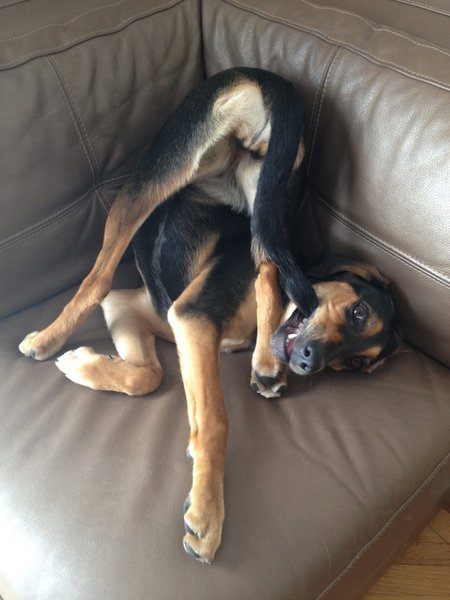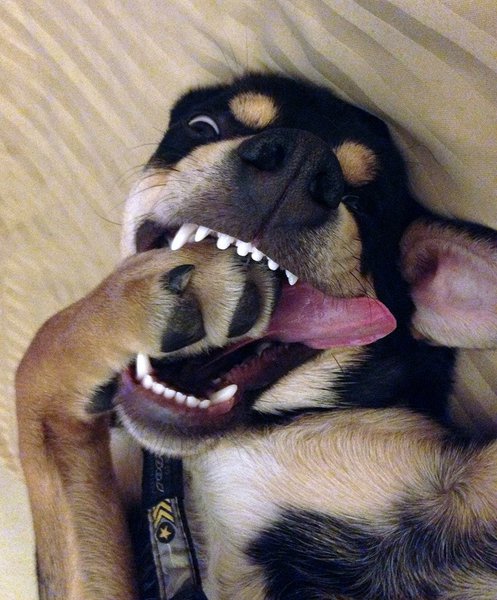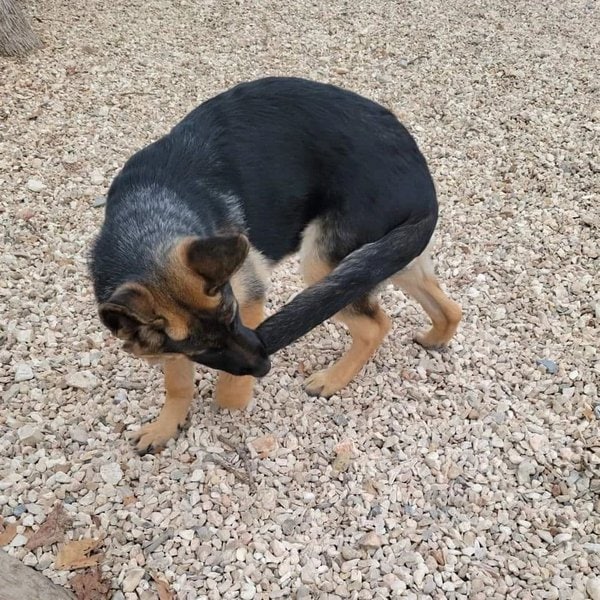Of all the weird actions that you may observe dogs partaking in, vigorously chewing and biting at their skins surely ranks high. And as a result, several dog owners tend to wonder why dogs indulge in this bizarre act of self-biting.
So, why do dogs bite themselves? Dogs bite themselves for several reasons, including stress, to relieve itching caused by skin conditions or food allergies, separation anxiety, and to let out excess energy that has built up due to inactivity.
Self-mutilation by dogs isn’t a pleasant experience, and this act can sometimes degenerate into serious injuries for the pooch. Consequently, to prevent your canine buddy from harming itself, this article details practical steps to curb this menace of self-biting by dogs and proactive steps you can take to ensure that your dog doesn’t even have to bite itself. Before we delve into all that, however, let’s take a closer look at the reasons why dogs commonly bite themselves.
Why Do Dogs Bite Themselves?

Common reasons why a dog would bite itself include stress, separation anxiety, boredom, itchiness due to food allergies, hormonal imbalances, the presence of skin parasites, and nutritional deficiencies, just to mention a few.
Stress
Dogs are capable of feeling stressed when exposed to uncomfortable situations. And one way by which you can tell that a pooch is stressed is if you observe the dog biting and gnawing at different parts of its body.
That said, situations that commonly induce stress in dogs include:
- Moving to a new, unfamiliar environment
- The introduction of a new household pet or a baby into the family
- Encountering a stranger
- Loud noises, such as thunderstorms or
- A sudden change in the dog’s daily routine, such as feeding time
Separation Anxiety
Most pooches can’t tolerate being separated from their favorite humans for a considerable period. And a dog that is typically left alone at home all day while its owner is away at work is prone to developing separation anxiety.
Separation anxiety is one of the leading causes of biting and self-mutilation in dogs, and if practical steps aren’t taken to curb this act, biting as a result of separation anxiety can develop into an obsessive-compulsive disorder for the pooch.
Boredom
Dogs typically don’t do well with being unattended for considerable periods. And if a pooch is bored, such a dog may resort to biting and chewing on parts of its body in a bid to curb boredom and let out excess energy.
Allergies
Biting in dogs isn’t only due to behavioral reasons, and a pooch may also chew at its skin to gain relief from an allergic reaction to its diet or other environmental allergens such as pollen, grass, or insecticides.
Seasonal allergies in dogs tend to induce symptoms of skin irritation and itchiness. And a dog will typically bite and chew at the affected spots on its skin to ease the itchiness.
Presence Of Parasites
Another reason a pooch may bite, chew and lick its skin is due to the presence and action of skin parasites such as fleas and ticks. These parasites typically cause a dog to feel itchy, and if left untreated, skin parasites can cause a pooch to bite and scratch its skin to the point of suffering hair loss.
Nutritional Deficiencies
The absence of certain fatty acids in a dog’s diet may cause the pooch in question to develop skin conditions with symptoms such as itchiness and dryness. And such a dog may take to biting and chewing its skin to gain relief from the itchiness.
Presence Of Irritants
At times, the presence of foreign objects, such as sticks, thorns, and stones, lodged within a pooch’s skin can drive such a dog crazy. And subsequently, such a pooch may bite and chew at its skin in a bid to get rid of these irritants.
Hormonal Imbalances
If a pooch isn’t either not producing enough of the thyroid hormone or producing too much of the hormone cortisol, such a dog may develop skin infections.
And it isn’t uncommon to observe dogs with hormonal imbalances biting and chewing at their skins to groom the bald spots that typically accompany these imbalances.
How Can I Stop My Dog From Biting Itself?

You can stop your dog from biting itself by administering medication to treat skin infections, eliminating skin parasites, promptly dealing with food allergies, and taking practical steps to reduce stress in the pooch.
Consult Your Vet
There are several reasons your pooch may be biting itself; Hence, in order to be sure of what is causing your canine buddy to bite itself, thereby ensuring the pooch gets appropriate treatment, it is recommended that you take your dog to see the vet.
Upon arriving at the hospital, your vet will typically carry out several physical tests and examinations on the pooch and ask several questions pertaining to the dog’s lifestyle to achieve a diagnosis.
That said, you can mostly stop your dog from biting itself by treating the underlying condition responsible for the pooch chewing on its skin in the first place. And some of the more common treatment methods for skin biting by dogs, prescribed by vets, include:
Use Of Medication
Most times, to provide instant relief to itchiness that causes a dog to chew and bite on its own skin, a vet may prescribe the use of certain medications.
Topical and systemic antibiotics are effective at treating skin conditions in dogs. And your vet may also recommend that you get certain steroids or anti-itch drugs to treat your canine buddy’s skin infections, thereby reducing itching and eliminating skin biting.
Eliminating Parasites
If it is determined that the cause of your pooch biting and chewing its own skin is as a result of parasites, your vet may prescribe the use of flea and tick control products that are effective at curbing the parasitic infestation.
Specially prepared, medicated anti-parasitic dog shampoos and ointments are usually effective at controlling skin parasites on dogs, and you may also be required to treat your house with insecticides to kill fleas.
Dealing With Food Allergies
If your pooch’s skin chewing is due to food allergies, you can, most times, provide instant relief to the pooch by getting rid of trigger food substances. Also, if your pooch is suffering from a food allergy, your vet can always recommend a special diet to help deal with this allergy.
The most common food allergies for dogs are those involving food substances such as corn, wheat, chicken, and beef; Hence, you can try feeding a dog suffering from a food allergy with a limited-ingredient, grain-free diet, with a unique source of protein such as duck meat.
Supplementing The Dog’s Diet
Skin reactions caused by nutritional deficiencies can, most times, be handled by including food supplements in the pooch’s diet.
Dry skin in dogs, which occurs due to the absence of fatty acids such as omega-3 and omega-6 in the pooch’s diet, can be treated by including food supplements such as fish oil or flaxseed in the dog’s meals.
However, regardless of how beneficial dietary supplements may be to dogs, you should consult with your vet before incorporating these supplements in your pooch’s meals.
Addressing Stress In The Dog
By directly dealing with the cause of your pooch’s stress, you can reduce and eliminate stress-motivated skin biting.
If you’re bringing a new pooch into your household, then you should ensure to properly introduce the new dog to your old dog. Additionally, you can provide toys or bones for your dog to chew on when it is stressed.
Suppose you’ve been spending considerable periods away from your canine buddy; In that case, it is advisable that you begin spending more time with the pooch to prevent the pooch from developing separation anxiety.
And if it’s unavoidable that you spend long periods away from your pooch, you can leave special mental stimulating toys to help keep the dog engaged while you’re away.
Skin biting that has degenerated into an obsessive-compulsive disorder is usually more challenging to control, and in such cases, you will require the help of a professional animal behaviorist.
How Can I Prevent My Dog From Biting Itself?
You can prevent your dog from biting itself by regularly exercising the pooch, slowly introducing new diets, trying as much as possible to reduce your dog’s contact with environmental allergies, and putting measures in place to control the flea population.
It is often said that prevention is better than cure, and by putting measures in place and engaging in certain activities, you can avoid dealing with injuries that result from your canine buddy biting and injuring itself.
That said, some of the ways you can prevent your dog from biting itself include:
Regular Exercising
By taking time to exercise your pooch, either with walks around the neighborhood, regular visits to the dog park, or play sessions with other dogs, you provide an outlet for the pooch to let out excess energy, thereby preventing boredom and subsequent skin biting.
Additionally, by regularly exercising your pooch, you can help prevent skin biting that develops due to separation anxiety. And the logic behind this is that a tired and happy dog will be less stressed when you have to leave it alone at home.

Slowly Introduce New Foods
It is often recommended that you slowly introduce new food substances to your canine buddy to prevent an allergic reaction and subsequent skin infections from the introduction of a new diet.
By slowly implementing changes to your pooch’s diet, you can closely watch for the development of allergic reactions, which typically cause the dog to develop skin infections and bite its own skin.
Proper Flea Control
Additionally, you can consult with your vet to develop a preventive flea control solution to help keep fleas in check, thereby helping to prevent the development of skin infections due to parasitic infestations and excessive skin biting, licking, and chewing by a pooch.
Restricting Your Pooch’s Contact With Environmental Allergens
Maintaining a clean and contaminant-free environment is key to preventing the development of skin conditions that may cause your pooch to become itchy and subsequently bite at its skin.
Avoid taking your pooch on walks in areas with high pollen or grass concentration, and ensure to properly wipe the dog’s paws and belly after a walk to get rid of any allergens that the dog may have come in contact with.
That said, getting rid of these allergens is easy said than done; Hence you can also bathe the pooch with special hypoallergenic shampoo to prevent itchy skin.





